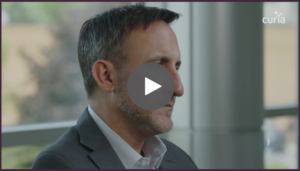Trends and Challenges in the Pharmaceutical Industry
Author: Christopher Conway, President of R&D, Curia Global
 Significant changes have taken place in the life sciences industry over the past few years. Since the Covid-19 pandemic, the U.S. government has urged biotech and pharmaceutical companies to increase domestic production in order to secure the drug supply chain and reduce our reliance on foreign organizations. Ultimately, this will ensure that patients get the medicines they need without delay. This effort, however, can be costly and time-consuming for U.S. manufacturers. Recent positive trends in biotech funding and continued innovation will be the keys to success.
Significant changes have taken place in the life sciences industry over the past few years. Since the Covid-19 pandemic, the U.S. government has urged biotech and pharmaceutical companies to increase domestic production in order to secure the drug supply chain and reduce our reliance on foreign organizations. Ultimately, this will ensure that patients get the medicines they need without delay. This effort, however, can be costly and time-consuming for U.S. manufacturers. Recent positive trends in biotech funding and continued innovation will be the keys to success.
Funding Challenges
While funding was scarce for non-Covid drug studies during the pandemic, the good news is that Q1 of 2024 is showing positive signs that funding for early phase studies may be starting to stabilize, and there appears to be increasing interest in funding for biologics and small molecules. It seems Phase I studies are now on the rise, emphasizing the need for economical manufacturing at all scales, including small scale production of orphan drugs and rare diseases, for example. This is particularly relevant as regulatory agencies tighten restrictions around keeping production in the United States. Drug companies certainly face cost pressures, and production in the U.S. must make financial sense for it to be espoused. Continuous flow technology is a large part of meeting that demand as it provides significant benefits for cost, as well as quality and safety.
Continuous Flow Technology
At Curia, we have over 25 years of experience in continuous flow, which has ramped up considerably due to increased market interest. From discovery all the way through manufacturing, continuous flow is faster and far more efficient. Quality is managed at each stage of production with automated controls and in-line monitoring so that parameters may be quickly adjusted and out-of-spec product removed while running. Catching defective product early equates to improved quality, less waste, reduced energy consumption, and lower production costs. The diligent monitoring also simplifies regulatory compliance.
Continuous flow is more economically feasible than batch processes for orphan drugs and those with thin margins. In addition to its consistent environment with well controlled parameters, the technology provides process safety information for achieving safer operations. It is also capable of rapid mixing and is amenable to extreme temperatures and pressures as well as hazardous reagents. These benefits have prompted Curia to adopt continuous flow chemistry for both small molecule and mRNA manufacturing so that therapies to help improve the lives of patients will get to market faster and with higher quality.
mRNA Opportunities and Challenges
Our interest in mRNA stems from its wealth of advantages for both patients and manufacturers. Compared to small molecules, there are many benefits of mRNA-based production, including simpler and faster manufacturing processes. The volume of material required is much less than a small molecule or antibody, and the chemistry is significantly less toxic than DNA therapeutics. For patients, mRNA is safer and more effective than injecting an antibody into the human body. From Curia’s perspective, focusing on R&D of mRNA and making our own plasmids is the best approach to meeting the needs of current and future markets.
It is not without its challenges, however. As mRNA production is still relatively new, successfully getting the template down and achieving suitable purification require substantial expertise. Fortunately, we already have considerable experience in this area, and we are currently investigating new technologies for large-scale purification. There is also a good deal of promising research relating to scaling up mRNA; more research and innovation is yet to come in that field. To help advance mRNA technology and other matters of medical interest, Curia is engaging in several private and public partnerships.
Collaborations and Partnerships
We are pleased to be working in partnership with a university on continuous flow processing for mRNA production in order to accelerate its timelines. In addition, we have a collaboration with Corning to advance continuous flow chemistry for targeted development and commercial scale manufacturing of APIs and intermediates. Continuous flow is most useful for processes not typically done in batch mode due to the complexity of scale up. We are working to apply continuous flow technology in these areas with Corning to facilitate faster, safer, and more robust production.
Various government agencies have also partnered with us to advance drug research. By leveraging our drug discovery and development expertise, we are helping medicine move from concept to cure across a variety of therapeutic applications. At Curia, we are fully committed to maximizing the power of our expertise to help improve as many lives as possible.
Artificial Intelligence
Emerging technologies such as artificial intelligence will also have a positive impact on patients, as it will accelerate timelines and improve quality. AI is a game-changer in the industry, with the potential to change the way we do research all the way from discovery through manufacturing. The whole drug discovery process can be improved with the application of AI – the possibilities are staggering.
We saw through the Covid years the ability to go from pre-clinical to commercial product in record timelines. What historically took 3–5 years, many organizations accomplished in just 18-24 months. The ability to predict, combined with the intellectual input from the process development chemists, will put us in a position to get drugs to market that much sooner and with higher quality. Patients will be the ultimate beneficiaries.
A Personal Note
 On a personal note, I am proud to be part of an organization that focusses first and foremost on helping people who face serious illness. Our patient-centric approach to innovation has always been the cornerstone of Curia, and we are humbled by the awards we have received that recognize our efforts on innovation and quality. Our true passion is helping patients through difficult times; improving their lives is the greatest reward.
On a personal note, I am proud to be part of an organization that focusses first and foremost on helping people who face serious illness. Our patient-centric approach to innovation has always been the cornerstone of Curia, and we are humbled by the awards we have received that recognize our efforts on innovation and quality. Our true passion is helping patients through difficult times; improving their lives is the greatest reward.